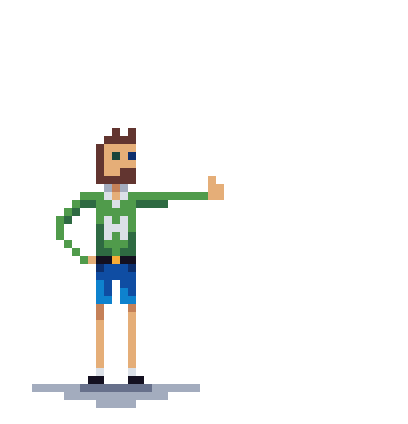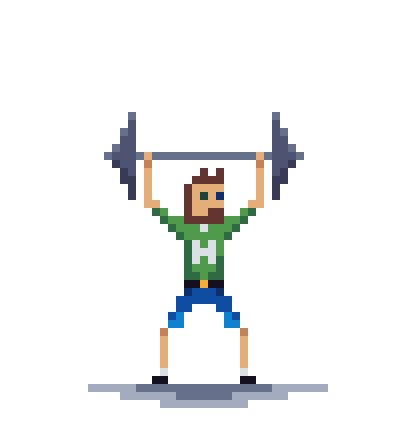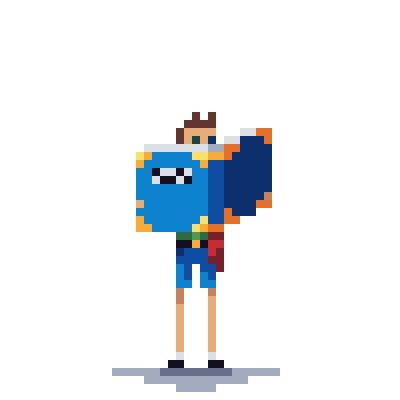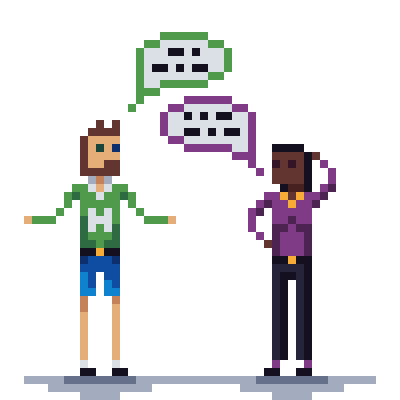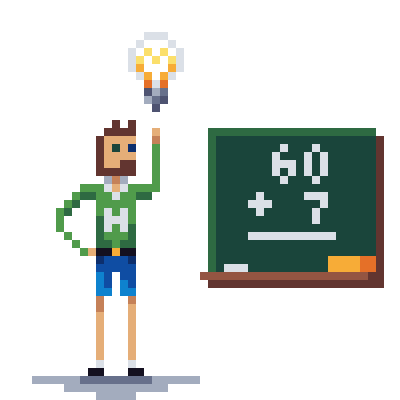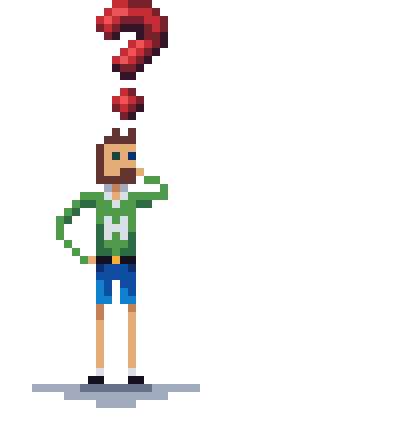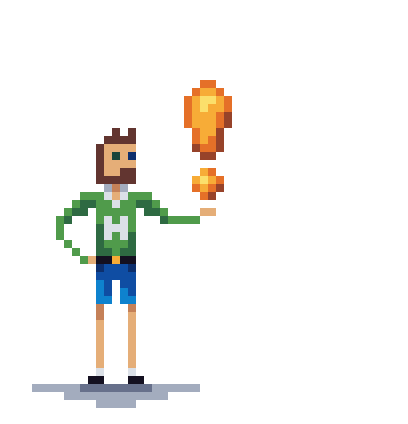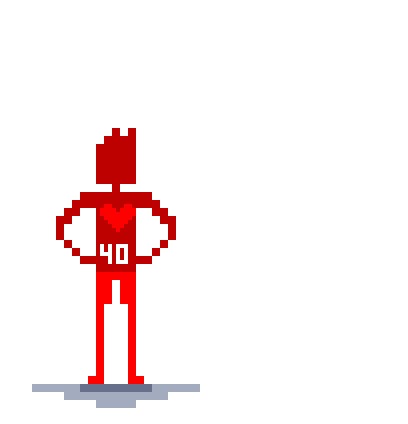Category:Character Creation
You will find all the essentials for the character creation here. This collective includes almost every element of HTBAH. More articles can be found under the category rulebook.
Skill Sets
In How to be a Hero three types of skill sets form the basis for your character and its Abilities: Actions, Knowledge and Social.
These skill sets indicate your character's Abilities in a particular field of skills.
If you want to perform an action you never learned explicitly, you must attempt a roll on the value of the skill set to which the corresponding action belongs.
What do these skill sets mean?
| Physical: | A physical action is what your character actively does, usually with physical consequences. It doesn't matter if you want to cut down trees or ride a horse, all these skills are checked against Physical. |
|---|---|
| Knowledge: | Your character needs knowledge, for example, to understand a foreign language, to be able to classify political connections, to understand mathematical principles or to be able to differentiate plants and animals. |
| Social: | Social skills are particularly necessary when interacting with NPCs. For example if your character wants to haggle with a merchant, try to manipulate someone’s thinking or see if they are being lied to based on their knowledge of human nature. |
You will find more details in the articles Actions, Knowledge and Social.
To look up
The values of skill sets are calculated by dividing the sum of the skill points used in a skill set by 10. It is rounded up commercially (i.e. from 5 upwards).
Example:
123 points spent in physical = 12 points in physical
129 points spent in physical = 13 points in physical
Actions
Skills of the action category are always physical, whether you are trying to lift a heavy object or are using fine motor skills to craft a wooden figurine from raw wood.
Here are a few examples of typical skills that are categorized as actions:
climbing running punching kicking shooting tailoring cooking lifting woodwork fishing carving hiding
Knowlege
Abilities/Skills, which find their roots in the knowledge category, are often neutral and analytical.
Examples for this would be abilities, which make great use of knowledge and education, such as foreign languages, tracking and herbalism.
Here are some examples for skills found the knowledge category:
German Polish English Latin Fashion design Geographics Tracking Politics Mathematics Literature knowledge Herbalism Plant knowledge Animal knowledge Programming Perception
Social
Social describes abilities and skills that have to do with all things interpersonal.
That, for example, could be lying or manipulation, even more passive abilities such as profiling.
Other abilities, like trading, are also part of the Social category:
Trading Lying Profiling Manipulating Charming Impressing Smooth talking Threatening Convincing
Abilities
Abilities are, as the name suggests, skills that your character explicitly has learned or mastered. Instead of rolling for a skill set it’s always advantageous to use a suitable ability instead.
Abilities are always categorized in either of the three skill sets. If you are uncertain which ability belongs into which category of skill sets, the GM will decide for you.
The final value of your ability score will be calculated from the ability points you spent and the respective skill set score. The bonus you gain from the skill set score will be added to each ability, unless the player decides against it.
You can find detailed information on this in the exemplary character creation.
To look up:
The final value of the ability that is supposed to be rolled on consists from the points spent in the ability plus the values from the skill set score.
Example : Hartmut spent 200 points in Actions ( actions = 20 ) and 50 of these in woodcutting ( woodcutting = 50. His final value in woodcutting is calculated as follows: woodcutting 50 + actions 20 = woodcutting 70
Eureka Points
Eureka points offer you the opportunity to take fate into your own hands. And here’s how it works:
Eureka points allow you to reroll a messed up check, as long as the initial roll was not a critical fail. Take your calculated basic value of each category Action, Knowledge, and Social and divide it by ten again. These are now your eureka points.
No cheating! You round to the nearest whole number e.g. if you have the basic value 12, you get one eureka point in this category. If you have a basic value of 15, you get 2 eureka points. They are only valid for their corresponding group.
This means you can’t use a point meant for Knowledge for a messed up running test (Physical). When a eureka point is used it is gone for the moment.
So, if you have just a single point in a category, think twice about when to use it.
Eureka points are valid for only one evening or adventure. This means that they don’t regenerate until you finish the adventure. Unused points are not transferable to the next evening or adventure! So if you start a second adventure with the same character, you will begin with full eureka points, no more and no less.
Your eureka points regenerate each new session. Should your adventure take longer than one evening, your eureka points regenerate.
Exemplary Character Creation
Preface
After all the explanations we have finally reached the actual character creation. If you want to look up any details, just take a look at the boxes labeled To look up that you can find on the Skill Sets and Abilities pages.
A short preamble: every human being is better - or worse - at doing certain things than others are. Some skills are easy to learn while others will be more of a challenge. As an example, if a person is physically fit, they are most likely working out in one way or another, and thus have more stamina than others.
A person who graduated from university usually has a broader range of knowledge and a stand-up comedian is probably good with people in some way.
Thus, the scores you get in your skill sets are based on the values in your Abilities.
Calculation
At the beginning every character starts with 400 ability points . First of all you should spend the points, in a way that suits your character, in your skill set. Thereafter count the points in the skill set subclasses and divide them by 10. A ability must not set to 0.
Here you should round.
Example:
129 Points in the Actions skill set = Actions 13
Once all your points are spent in your preferred abilities all what is left are two steps till your character is ( arithmetically) done.
Now we are about to calculate the eureka points. Take your points ability points and divide by 10.
Here you should round.
Example:
Actions 13 divide by 10 = 1,3 = 1 eureka points in actions
Actions 18 divide by 10 = 1,8 = 2 eureka points in actions
Abilities are also used to show how good or easy something is to be learned, therefore they have influence to the skills.
Take the ability value and add it to every skill belonging.
Example:
Woodcutting 50 + Actions 13 = Woodcutting 63
Now your character is ready!
Last but not least, your skills can not have more than 100 points. If you get higher during the calculation, take the surplus and spend them elsewhere in this given ability.
Here are two suggestions for maximizing the fun:
Avoid skills with low values. Spending one or even 5 points in every skill will not help you at all. If a player wants this desperately, they can waive the ability bonus for certain skills.
Character creation in tabular form
Howkys character sheet (400 points):
Distribute first…
| Action | Knowledge | Social |
|---|---|---|
| Spent: | Spent: | Spent: |
| Playing Soccer: 40 | Conception of Pen-and-Paper: 75 | Acting: 68 |
| Mobility: 30 | Crazy Backstory: 40 | Illustrate a wiki: 40 |
| Media Marketing: 55 | Interaction with beans: 52 |
Add up…
| Action | Knowledge | Social |
|---|---|---|
| Spent:70 | Spent: 170 | Spent: 160 |
| Playing Soccer: 40 | Conception of Pen-and-Paper: 75 | Acting: 68 |
| Mobility: 30 | Crazy Backstory: 40 | Illustrate a wiki: 40 |
| Media Marketing: 55 | Interaction with beans: 52 |
Divide by ten to receive the values…
| Action 7 | Knowledge 17 | Social 16 |
|---|---|---|
| Spent:70 | Spent: 170 | Spent: 160 |
| Playing Soccer: 40 | Conception of Pen-and-Paper: 75 | Acting: 68 |
| Mobility: 30 | Crazy Backstory: 40 | Illustrate a wiki: 40 |
| Media Marketing: 55 | Interaction with beans: 52 |
Divide by ten again to get the eureka points ...
| Action 7 (EP: 1) | Knowledge 17 (EP: 2) | Social 16 (EP: 2) |
|---|---|---|
| Spent:70 | Spent: 170 | Spent: 160 |
| Playing Soccer: 40 | Conception of Pen-and-Paper: 75 | Acting: 68 |
| Mobility: 30 | Crazy Backstory: 40 | Illustrate a wiki: 40 |
| Media Marketing: 55 | Interaction with beans: 52 |
and finally sum it up!
| Action 7 (EP: 1) | Knowledge 17 (EP: 2) | Social 16 (EP: 2) |
|---|---|---|
| Spent:70 | Spent: 170 | Spent: 160 |
| Playing Soccer: 40 + 7 =47 | Conception of Pen-and-Paper: 75 + 17 = 92 | Acting: 68 16 = 84 |
| Mobility: 30 + 7 = 37 | Crazy Backstory: 40 + 17 = 57 | Illustrate a wiki: 40 + 16 = 56 |
| Media Marketing: 55 + 17 = 72 | Interaction with beans: 52 + 16 = 68 |
Health Points
Each character starts off with 100 HP. Once their HP drops below 10, the character falls unconscious and needs medical attention. Should his HP drop to 0, the character dies. When a character is badly wounded by a single attack and loses more than 60 HP at once, he passes out as well and is therefore no longer able to parry or attack.
He also needs medical aid in order to be able to fight and act again.
Advantages and Disadvantages
This chapter describes an optional module. It’s especially recommended for game-masters and players who have already gained some experience in pen-and-paper universes and/or want to add a little more “spice” to their character. You can skip this part if this is your first pen-and-paper.
Every person is different. Some people are even restricted or inherently have some special advantages. These differences are described very well in their abilities, but a person is more than just their abilities. Even for an experienced role-player it can be a challenge to represent these other characteristics. Because of this, player and gamemaster can give their characters the final touch with disadvantages and characteristics. Of course, these characteristics and disadvantages are a great opportunity for the game-master to challenge the characters individually.
Disadvantages
Abilities describe the strengths and advantages of a character which you can use as a tool to overcome problems. Furthermore your character can have disadvantages which can restrict you in some situations.
These disadvantages are marked with a minus in its skill sets but do not affect the calculation of the talent-value or ability-value and do not receive a bonus from the talent-value . If the game-master or the situation dictates, you roll the dice to your disadvantages in the usual manner. If your dice eyes count less than the disadvantage value, the expected event occurs.
Agnes has given herself a disadvantage “irascible” with -20. If the dice roll result is less than 20, her character reacts to the insult with unbridled rage. If the dice result is above that, she ignores the provocation. In this case the appropriate skill setswould be social, but this can always be clarified with the game-master.
Overcome a disadvantage
As compensation, you can work out a proportional bonus together with the game-master. These can be additional items, better finance, more skill or life points. However, it should be ensured that the malus is taken into account and played out in the game in an appropriate manner. The higher the bonus received, the more influential the disadvantage must be.
Tobias plays a socially incompetent character. But since he wants to give his character even more depth and wants to have another 40 points on computer knowledge, he agrees with his game-master that he gives his character the disadvantage “neurotic”. He commits himself that his character compulsively always wants to keep everything clean and tidy. For Tobias, this clearly influences the course and style of play. After some negotiations he receives 35 additional skill points from the game-master.
Characteristics
While disadvantages describe pure disadvantages, characteristics are more general. Therefore no points will be awarded on it. Characteristics are traits of a character that have a direct and indirect influence on the way your character moves in the world, the gameplay and the way you play. Each characteristic gives you both advantages and disadvantages in proportional height. If your characteristic only gives you advantages, it is a skill for which you must spend skill points.
You can give your character one to a maximum of two characteristics. The important thing when choosing is that you should be able to play out these characteristics. If at the beginning of the role-playing game you are not yet sure which characteristic fits your character best, then wait and give yourself one at a suitable opportunity in consultation with your game-master.
Jonas has taken the characteristic "pacifist". When Susanne gets into a fight with the salesman, his calm disposition and conciliatory nature allow him to deescalate the situation and prevent an argument before anyone notices them. A little later the group is ambushed and has to face the fight. Jonas has to rely on his friends to remedy the situation, as he lacks any fighting experience, but also the will to take physical action against another person.
Examples
In the following you will find some examples of characteristics. Even though every player and game-master may should of course give free rein to his creativity to design his own suitable characteristics. Thus, characteristics limit your ability to act, but also expand your options in other situations or open up completely new paths.
| Name | Description |
|---|---|
| Fearless | You're not easily intimidated. No danger can frighten you, but you will often ignore a warning, where caution would have been advisable. |
| Light sleeper | It's hard to surprise you. At night, you always sleep with one eye open and therefore regenerate only half as much HP in rest periods. |
| Blockhead | You're a hard man to turn from your path. You often stick to your idea despite good counter-arguments and you are difficult to influence. |
| Bookworm | You have a phenomenal general knowledge and live in your own world. In contact with other people you may stand out because of your peculiarity. |
| Miser | Take care of the cruiser. You don't honour the cruiser, you're not worth the pounds. You have considerably more cash at your disposal and always try to spend as little money as possible, even if your negotiating partner will not be happy about it and the quality of your purchases will suffer. |
| Lucky dub | Every dog has its day. You may act a bit clumsy with many things, but Fortuna is with you and you can reroll any throw you wish one per day. |
| Asexual/Aromantic | You are unresponsive to other characters’ advances. You would never get the idea to romantically ensnare someone else. The thought alone makes you feel sick. |
| Sensitive | All of your senses are sharpened to the extreme and ready at all times. Nothing slips past you easily. On the other hand you are much more sensitive to irritation, be it smell, pain, sounds, quick change of temperature or light. |
| Leatherskin | ‘Tis but a Scratch! You can take more hits than others (any damage is halved), but are far slower (Initiative malus) |
| Specialist | You are extraordinarily well-versed in one attribute and checks cannot be adjusted. In return you will have a malus of -10 on all other checks. |
| Bloodrush | In the heat of battle one can quickly lose control. During bloodrush all checks are [erleichtert] by 20, all damage (also the one you recieve) is doubled. You are heavily exhausted after battle. |
| Celebrity | You are a star, and receive special treatment accordingly. Whenever you want to travel anonymously, you would better think of something. |
| Coward |
You are scared of almost everything and often stand in your own way. Thanks to your paranoia you recognize dangers quicker than others and can react earlier. |
| Know-it-all | You know everything and can do everything, or at least think so. Your abilities never exceed 50. You receive one more eureka point per skill category. |
| Alcoholic | You can simply not live without alcohol, whenever there is something to drink, you are in. If you are sober for a longer while (>3 hours) you become nervous and impatient. But your threshold for pain or embarrassment while drunk is impressive. |
| Player | Life is a game. That or something similar is likely to be your life motto. You can’t without it. You try to turn almost any activity into a contest and bet money on it. Because of this you are knowledgeable about Poker & Co.; Also your unrivaled calmness while playing stands out. |
| Pacifist |
Through your serene spirit and calming nature you can de escalate between parties. As a mediator,however, you lack any battle experience and only use violence in self defense. |
| Chronic stupidity | For you, the news are celebrity news on private networks, reading is overrated and [Niveau ist eine Handcreme]. Yet somehow you have made it through life. Your [Wissenskategorie] can not include more than 100 points. |
| Foolish |
You believe anything you are told. Because of this you change your opinion frequently and are easily manipulated more easily by others. But you are perceived as very likeable. |
| ? | Which other characteristics come to your mind? Enter them here! |
-
-
-
-
-
-
Unterkategorien
Diese Kategorie enthält nur die folgende Unterkategorie:
C
Seiten in der Kategorie „Category:Character Creation“
Folgende 9 Seiten sind in dieser Kategorie, von 9 insgesamt.

